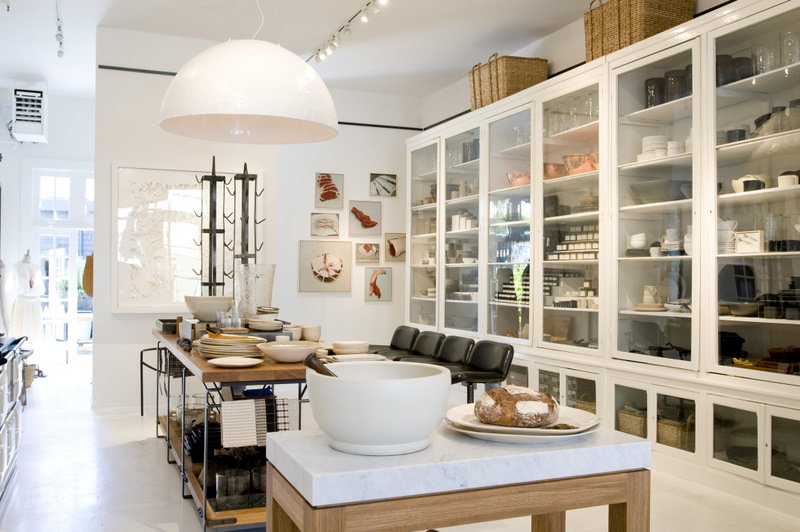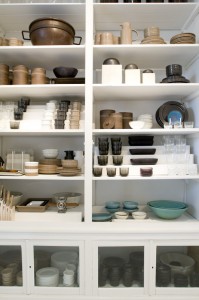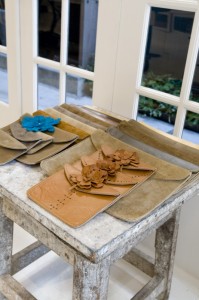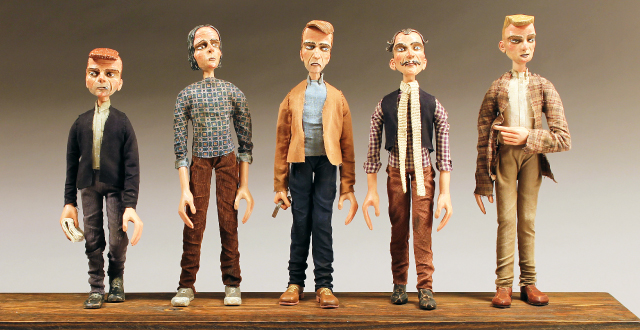Shopping: March
March marks the beginning of spring, a time for renewal, which often translates to home improvement. Sometimes that means pulling out the mop and bucket for a round of spring cleaning, but other times that means redecorating the house. If it’s the latter, the revamped March, located in a home design ghetto on Sacramento Street in the Laurel Heights neighborhood, features items for the hearth and home, with an emphasis on the kitchen.
MARCH, which works with both designers and the public, originally opened in 2003. Previously focused exclusively on European antique and modern furniture and goods for the home, the focus shifted in 2011 to concentrate on contemporary pieces for the kitchen. Though, it still carries antiques mixed in with the modern.
Floor to ceiling, the dominating color of the retail space is white — from the tiled walls to the whitewashed cement floor, from the large dome lights to a massive cabinet from a monastery in Ghent, Belgium, down to Tahiti Pehrson’s intricate monochromatic paper works that hang on the wall. The brightness of the white interiors is maximized by the flood of light that streams through from the large street-facing window and French doors on the east side and back of the store.
But the store’s interior isn’t all pure design seriousness. Dangling above the customer service counter are pieces of stuffed fabric wrapped up to look like sausages in a butcher’s shop. The theme is carried over to the back wall with still life paintings of slices of meat by Carrie Mae Smith, an artist and daughter of a butcher.
As for the inventory, Sam Hamilton, owner of MARCH, often works with artisans to bring San Franciscans special pieces for their homes. Such artisans include Brickett Davda, who produces a range of handmade tableware in colors inspired by the British coast and countryside. Mixed in with one-of-a-kind items are also handcrafted ceramics from Victoria Morris, pots from Brooklyn Copper Cookware and hand cut and sewn table linens from Boxwood Linens.
Larger showpiece items include furniture, such as Art Nouveau chairs by the late Belgian designer Serrurier-Bovy ($6800) and an oxidized oiled cherry wood bench ($6500). There are also accent pieces like a set of two large low round woven baskets ($265).
Those are the big ticket items, but there are also kitchen items priced to fit the budget of the everyday shopper, such as white mini tart dishes from Emile Henry ($10), gray teacups from Billy Cotton ($20), squat water glasses ($7), black and brown suede pot holders ($22), striped gray and blue tea towels ($16) or small and large cast iron pans from Lodge ($18 and $28, respectively).
More specialty housewares includes craftsman Michael Hammer’s set of one-of-a-kind hand forged high-carbon steel steak knives with walnut handles that come wrapped in their own leather roll ($245). There are also turquoise bowls ($195) from Christiane Perrochon, an artisan who uses high temperature glazes to bring out hues rarely seen in stoneware.
Once the home is decorated, the next step is to stock the larder, and that’s possible with preserves, vinegars and spices from the MARCH Pantry line. The line is made through collaborations with artisan producers from California like Katz and Company, who provide extra virgin olive oil ($25) and red wine vinegar ($15); seasonal jams, nut butters, chutneys, preserves and almond butter from LouLou’s Garden ($12 – $14) and Le Sanctuaire spices, like crushed chili and caraway seed ($8 – $12).
With the stage set and ingredients procured, all that’s left is to pull out the cookbooks that are as pretty to look at as they are fun to use, like the Viennese delights of Neue Cuisine ($45), the all ages River Cottage Family Cookbook ($32), and Turquoise: A Chef’s Travels in Turkey ($50).
The MARCH brand extends to a small line of clothing made of natural fabrics and dyes, such as a vest of green silk Khadi cloth ($375), an artisan smock of hemp wool dipped in indigo ($525), and a pinstriped dobby Kurta, or loose shirt ($385). There’s also a small line of accessories including bracelets of leather ($65) and wood ($135), or a leather flower ($52) that could be pinned on a handbag or jacket.
The store is still going through a bit of a transition. In the future, the MARCH will host food demonstrations and the carriage house tucked in the back will be converted into more of a cash and carry area. But even for those just starting to envision the remodel or redesign of their kitchen or home, MARCH is a great place to visit for home goods or simply for interior design inspiration.










